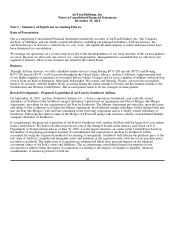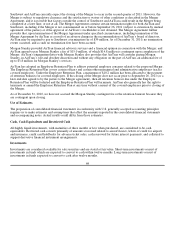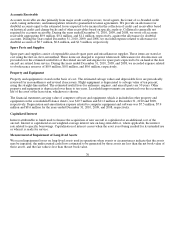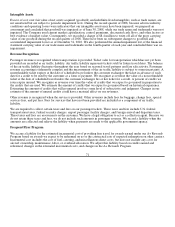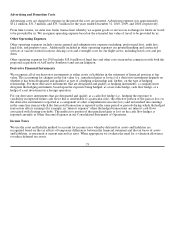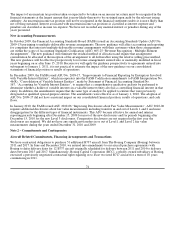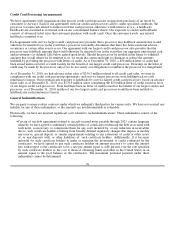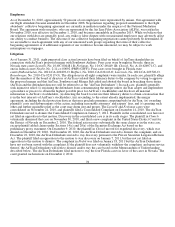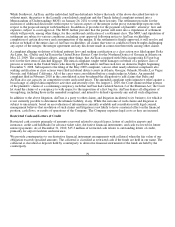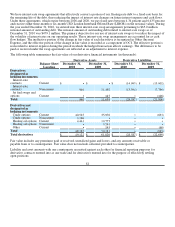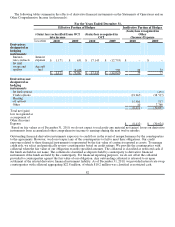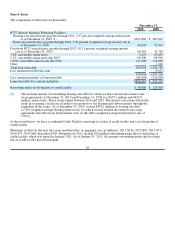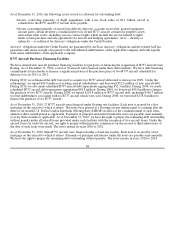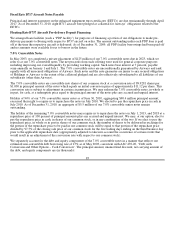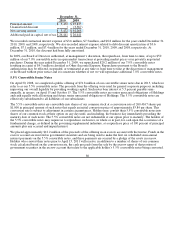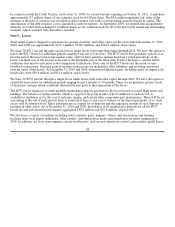Airtran 2010 Annual Report Download - page 86
Download and view the complete annual report
Please find page 86 of the 2010 Airtran annual report below. You can navigate through the pages in the report by either clicking on the pages listed below, or by using the keyword search tool below to find specific information within the annual report.
Employees
As of December 31, 2010, approximately 50 percent of our employees were represented by unions. Our agreement with
our flight attendants became amendable in December 2008. Negotiations regarding proposed amendments to the flight
attendants’ collective bargaining agreement are currently in mediation under the auspices of the National Mediation
Board. The agreement with our pilots, who are represented by the Air Line Pilots Association (ALPA), was ratified in
November 2010, was effective on December 1, 2010, and becomes amendable in December 2015. While we believe that
our relations with labor are generally good, any strike or labor dispute with our unionized employees may adversely affect
our ability to conduct business. The outcome of our collective bargaining negotiations cannot presently be determined. If
we are unable to reach agreement with any of our unionized work groups regarding the terms of their collective
bargaining agreements or if additional segments of our workforce become unionized, we may be subject to work
interruptions or stoppages.
Litigation
As of January 31, 2011, eight purported class action lawsuits have been filed on behalf of AirTran shareholders in
connection with AirTran's proposed merger with Southwest Airlines. Four cases were brought in Nevada: three in
Nevada state court (Leonelli, No. 10-OC-00448 1B; Frohman, No. 10-OC-00449 1B; Church, No. A-10-626971-C), and
one in federal court (Nesbit, No. 2:11-cv-00092 (PMP)(GWF)). Four cases were brought in Florida state
court (DeBardelaben, No. 2010-CA-022893-O; Hoffner, No. 2010-CA-022143-O; Loretisch, No. 2010-CA-023520-O;
Rosenberger, No. 2010-CA-023117-O). The allegations in all eight complaints were similar. In each case, plaintiffs allege
that the members of the board of directors of AirTran violated their fiduciary duties to the company by voting to approve
the proposed merger and that AirTran, Southwest and Merger Sub aided and abetted the board in breaching those duties.
(AirTran and the defendant directors will be referred to as the "AirTran Defendants".) In each case, plaintiffs generally
seek injunctive relief: (i) enjoining the defendants from consummating the merger unless AirTran adopts and implements
a procedure or process to obtain the highest possible price for AirTran’s stockholders and discloses all material
information to AirTran’s stockholders, (ii) directing the board to exercise their fiduciary duties to obtain a transaction that
is in the best interests of AirTran’s stockholders, (iii) rescinding, to the extent already implemented, the merger
agreement, including the deal protection devices that may preclude premium competing bids for AirTran, (iv) awarding
plaintiffs' costs and disbursements of the action, including reasonable attorneys’ and experts’ fees, and (v) granting such
other and further equitable relief as the court may deem just and proper. The Leonelli and Frohman cases were
consolidated on November 24, 2010, and plaintiffs filed a Consolidated Complaint on December 14, 2010. The AirTran
Defendants moved to dismiss the Consolidated Complaint on January 7, 2011. Plaintiffs in the consolidated case have not
yet filed an opposition to that motion. Discovery in the consolidated case is in its early stages. The plaintiff in Church
voluntarily dismissed that case on November 30, 2010, and filed a new complaint in the United States District Court for
the District of Nevada on December 2, 2010. The federal action raises substantially the same claims as in the state case,
except plaintiff added claims under Sections 14(a) and 20(a) of the Securities Exchange Act based on the
preliminary proxy statement. On December 9, 2010, the plaintiff in Church moved for expedited discovery, which was
denied on December 29, 2010. On December 20, 2010, the AirTran Defendants moved to dismiss the complaint, and on
December 22, 2010, the AirTran Defendants moved to stay discovery pursuant to the Private Securities Litigation Reform
Act. The plaintiff filed an opposition to the motion to stay discovery on January 7, 2011, but has not yet filed an
opposition to the motion to dismiss. The complaint in Nesbit was filed on January 18, 2011 but the AirTran Defendants
have not yet been served with the complaint. If the plaintiff does not voluntarily withdraw the complaint, and upon service
thereof, the AirTran Defendants will seek to dismiss and/or stay the case based on the Memorandum of Understanding
described below. The AirTran Defendants filed motions to stay the four Florida cases in favor of the cases in Nevada. The
court granted such motions on December 2, 2010.
78


